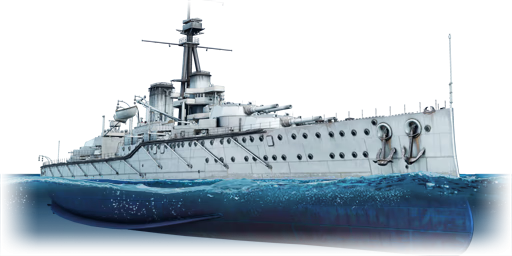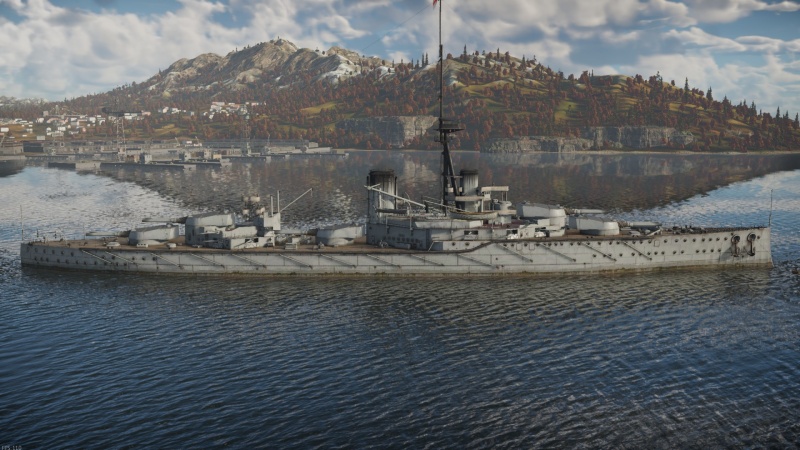Difference between revisions of "HMS Orion"
m (Reverted edits by U5014050 (talk) to last revision by Colok76286) |
(→Description) |
||
| Line 6: | Line 6: | ||
== Description == | == Description == | ||
<!-- ''In the first part of the description, cover the history of the ship's creation and military application. In the second part, tell the reader about using this ship in the game. Add a screenshot: if a beginner player has a hard time remembering vehicles by name, a picture will help them identify the ship in question.'' --> | <!-- ''In the first part of the description, cover the history of the ship's creation and military application. In the second part, tell the reader about using this ship in the game. Add a screenshot: if a beginner player has a hard time remembering vehicles by name, a picture will help them identify the ship in question.'' --> | ||
| − | The '''{{Specs|name}}''' | + | The '''{{Specs|name}}''', as the lead ship of her class of 4 was laid down in November 1909. Launched in August 1910 and commissioned in January 1912, she and her class would feature the new {{Annotation|13.5-inch|343 mm}} gun. This along with their thicker armour would lead to them being colloquially referred to as "super-dreadnoughts". Despite this and despite being active for the entirety of the First World War, she would see relatively little combat. Seeing action in the infamous Battle of Jutland and the Action if the 19th of August, the vast majority of her career during the war was simply routine patrols and training. Following the end of the war, Orion would serve as a gunnery training ship for about a year before being sold for scrap in 1922. |
| + | |||
| + | Introduced in [[Update "Air Superiority"]], HMS Orion follows [[HMS Dreadnought]] in the Bluewater fleet. Compared to Deadnought, she features heavier armour and more powerful guns at {{Annotation|13.5-inch|343 mm}} compared to the {{Annotation|12-inch|305 mm}} battery of Dreadnought. Notably, she maintains the same top speed despite the increase in capability. Unlike Dreadnought though, HMS Orion comes in a 1914 refit, meaning she lacks even the paltry pair of {{Annotation|3-inch|76 mm}} anti-aircraft guns. This means aircraft have essentially free reign over the Orion, and is a very noticeable weakness. | ||
== General info == | == General info == | ||
Revision as of 01:10, 20 February 2024
Contents
Description
The Orion-class, HMS Orion (52), 1914, as the lead ship of her class of 4 was laid down in November 1909. Launched in August 1910 and commissioned in January 1912, she and her class would feature the new 13.5-inch gun. This along with their thicker armour would lead to them being colloquially referred to as "super-dreadnoughts". Despite this and despite being active for the entirety of the First World War, she would see relatively little combat. Seeing action in the infamous Battle of Jutland and the Action if the 19th of August, the vast majority of her career during the war was simply routine patrols and training. Following the end of the war, Orion would serve as a gunnery training ship for about a year before being sold for scrap in 1922.
Introduced in Update "Air Superiority", HMS Orion follows HMS Dreadnought in the Bluewater fleet. Compared to Deadnought, she features heavier armour and more powerful guns at 13.5-inch compared to the 12-inch battery of Dreadnought. Notably, she maintains the same top speed despite the increase in capability. Unlike Dreadnought though, HMS Orion comes in a 1914 refit, meaning she lacks even the paltry pair of 3-inch anti-aircraft guns. This means aircraft have essentially free reign over the Orion, and is a very noticeable weakness.
General info
Survivability and armour
Talk about the vehicle's armour. Note the most well-defended and most vulnerable zones, e.g. the ammo magazine. Evaluate the composition of components and assemblies responsible for movement and manoeuvrability. Evaluate the survivability of the primary and secondary armaments separately. Don't forget to mention the size of the crew, which plays an important role in fleet mechanics. Save tips on preserving survivability for the "Usage in battles" section. If necessary, use a graphical template to show the most well-protected or most vulnerable points in the armour.
Mobility
Write about the ship's mobility. Evaluate its power and manoeuvrability, rudder rerouting speed, stopping speed at full tilt, with its maximum forward and reverse speed.
| Mobility Characteristics | |||
|---|---|---|---|
| Game Mode | Upgrade Status | Maximum Speed (km/h) | |
| Forward | Reverse | ||
| AB | |||
| Upgraded | 45 | 28 | |
| RB/SB | |||
| Upgraded | 39 | 24 | |
Modifications and economy
Armament
Primary armament
Provide information about the characteristics of the primary armament. Evaluate their efficacy in battle based on their reload speed, ballistics and the capacity of their shells. Add a link to the main article about the weapon: {{main|Weapon name (calibre)}}. Broadly describe the ammunition available for the primary armament, and provide recommendations on how to use it and which ammunition to choose.
| Penetration statistics | |||||||
|---|---|---|---|---|---|---|---|
| Ammunition | Type of warhead |
Penetration @ 0° Angle of Attack (mm) | |||||
| 1,000 m | 2,500 m | 5,000 m | 7,500 m | 10,000 m | 15,000 m | ||
| 13.5 inch HE | HE | 77 | 77 | 77 | 77 | 77 | 77 |
| 13.5 inch APC Mk.IIa | APCBC | 538 | 486 | 412 | 353 | 305 | 244 |
| 13.5 inch CPBC | SAPCBC | 287 | 258 | 217 | 185 | 159 | 126 |
| Shell details | ||||||||||||
|---|---|---|---|---|---|---|---|---|---|---|---|---|
| Ammunition | Type of warhead |
Velocity (m/s) |
Projectile mass (kg) |
Fuse delay (s) |
Fuse sensitivity (mm) |
Explosive mass (TNT equivalent) (kg) |
Ricochet | |||||
| 0% | 50% | 100% | ||||||||||
| 13.5 inch HE | HE | 787 | 567 | 0 | 0.1 | 88.11 | 79° | 80° | 81° | |||
| 13.5 inch APC Mk.IIa | APCBC | 787 | 574.5 | 0.025 | 20 | 19.91 | 48° | 63° | 71° | |||
| 13.5 inch CPBC | SAPCBC | 787 | 567 | 0.035 | 26 | 53.3 | 48° | 63° | 71° | |||
Secondary armament
Some ships are fitted with weapons of various calibres. Secondary armaments are defined as weapons chosen with the control Select secondary weapon. Evaluate the secondary armaments and give advice on how to use them. Describe the ammunition available for the secondary armament. Provide recommendations on how to use them and which ammunition to choose. Remember that any anti-air armament, even heavy calibre weapons, belong in the next section. If there is no secondary armament, remove this section.
| Penetration statistics | |||||||
|---|---|---|---|---|---|---|---|
| Ammunition | Type of warhead |
Penetration @ 0° Angle of Attack (mm) | |||||
| 1,000 m | 2,500 m | 5,000 m | 7,500 m | 10,000 m | 15,000 m | ||
| 4 inch HE | HE | 11 | 11 | 11 | 11 | 11 | 11 |
| 4 inch CPC | SAPBC | 102 | 84 | 60 | 45 | 34 | 26 |
| Shell details | ||||||||||||
|---|---|---|---|---|---|---|---|---|---|---|---|---|
| Ammunition | Type of warhead |
Velocity (m/s) |
Projectile mass (kg) |
Fuse delay (s) |
Fuse sensitivity (mm) |
Explosive mass (TNT equivalent) (g) |
Ricochet | |||||
| 0% | 50% | 100% | ||||||||||
| 4 inch HE | HE | 873 | 14.06 | 0 | 0.1 | 700 | 79° | 80° | 81° | |||
| 4 inch CPC | SAPBC | 873 | 14.06 | 0.015 | 5 | 420 | 48° | 63° | 71° | |||
Additional armament
Describe the available additional armaments of the ship: depth charges, mines, torpedoes. Talk about their positions, available ammunition and launch features such as dead zones of torpedoes. If there is no additional armament, remove this section.
Usage in battles
Describe the technique of using this ship, the characteristics of her use in a team and tips on strategy. Abstain from writing an entire guide – don't try to provide a single point of view, but give the reader food for thought. Talk about the most dangerous opponents for this vehicle and provide recommendations on fighting them. If necessary, note the specifics of playing with this vehicle in various modes (AB, RB, SB).
Pros and cons
Summarise and briefly evaluate the vehicle in terms of its characteristics and combat effectiveness. Mark its pros and cons in the bulleted list. Try not to use more than 6 points for each of the characteristics. Avoid using categorical definitions such as "bad", "good" and the like - use substitutions with softer forms such as "inadequate" and "effective".
Pros:
Cons:
History
Describe the history of the creation and combat usage of the ship in more detail than in the introduction. If the historical reference turns out to be too long, take it to a separate article, taking a link to the article about the ship and adding a block "/History" (example: https://wiki.warthunder.com/(Ship-name)/History) and add a link to it here using the main template. Be sure to reference text and sources by using <ref></ref>, as well as adding them at the end of the article with <references />. This section may also include the ship's dev blog entry (if applicable) and the in-game encyclopedia description (under === In-game description ===, also if applicable).
Media
Excellent additions to the article would be video guides, screenshots from the game, and photos.
See also
Links to articles on the War Thunder Wiki that you think will be useful for the reader, for example:
- reference to the series of the ship;
- links to approximate analogues of other nations and research trees.
External links
Paste links to sources and external resources, such as:
- topic on the official game forum;
- other literature.
| Portsmouth Royal Dockyard | |
|---|---|
| Frigates | |
| Leopard-class | HMS Leopard |
| Heavy Cruisers | |
| County-class | HMS London |
| Battleships | |
| Unique ships | HMS Dreadnought |
| Orion-class | HMS Orion |
| Iron Duke-class | HMS Iron Duke |
| Britain battleships | |
|---|---|
| HMS Dreadnought* | |
| Colossus-class | HMS Colossus |
| Orion-class | HMS Orion |
| Iron Duke-class | HMS Iron Duke · HMS Marlborough |
| Queen Elizabeth-class | HMS Barham |
| * Unique ship | |





